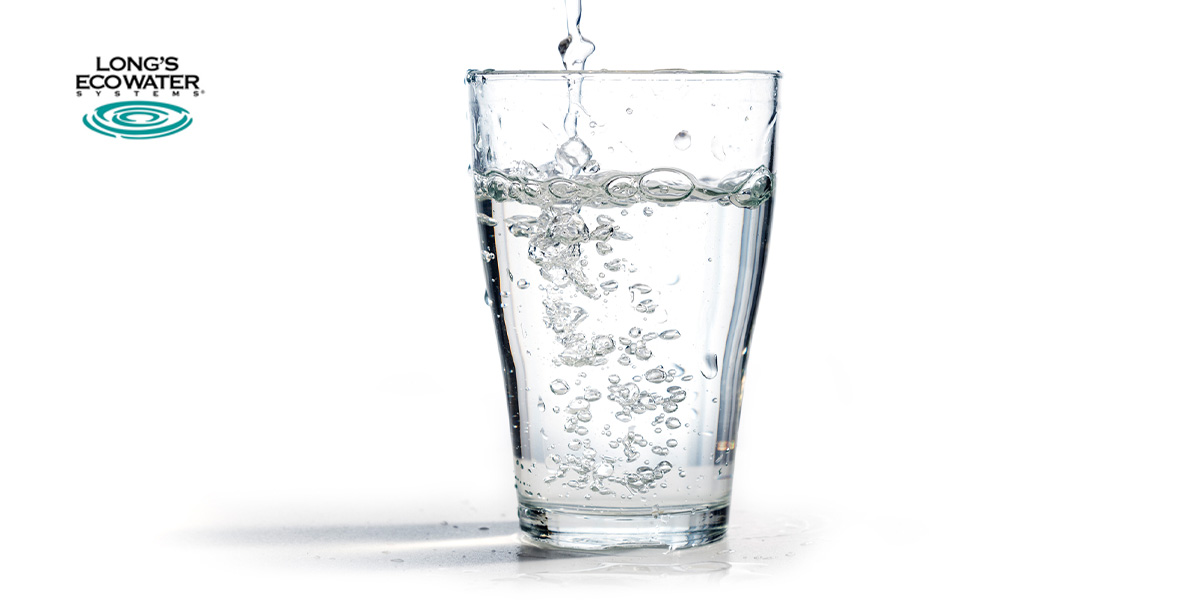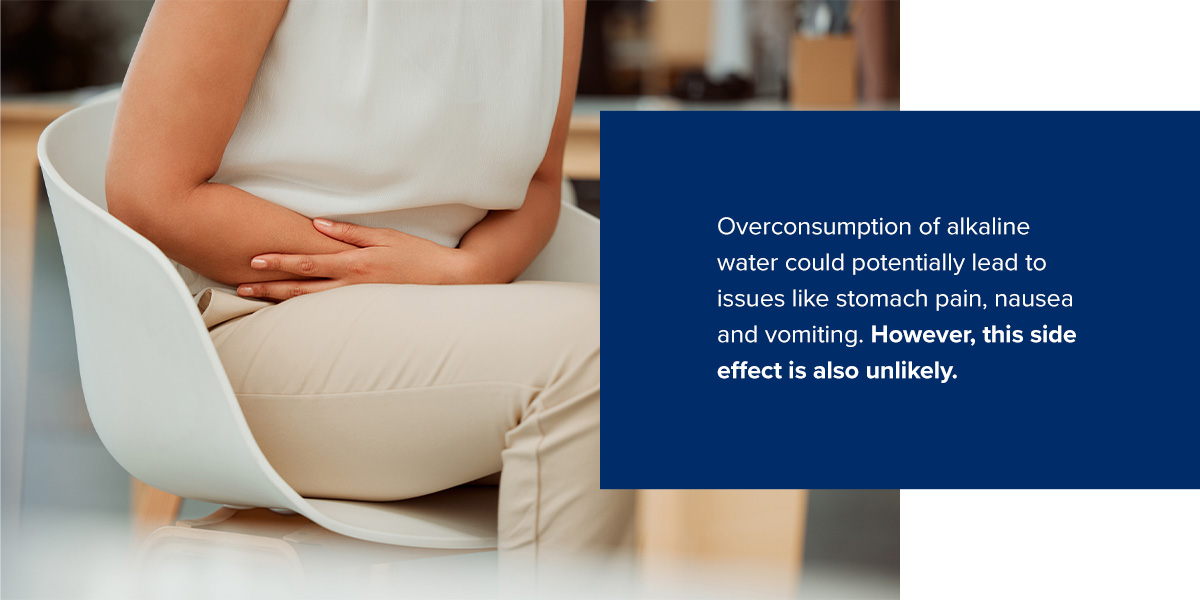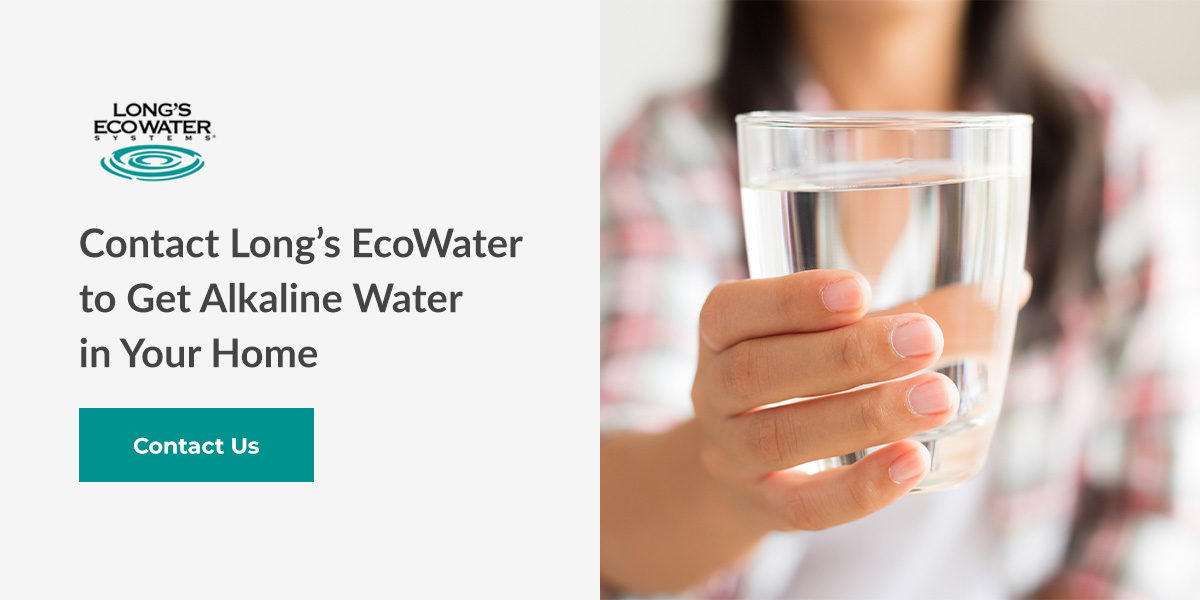
Alkaline water has been a trending topic in recent years. In 2021, bottled ionized alkaline water saw a global revenue of $46 million and a 20% growth from the previous year. Many people have heard about alkaline water and the health benefits it supposedly provides. But what is it, exactly? Is alkaline water good for you? Below, we’ll explain more about this new trend in hydration.
The pH Scale
To understand what alkaline water is, we first have to understand what acids, bases and pH are.
The pH scale, a negative logarithmic scale, measures the concentration of positively charged hydrogen ions a substance gives off in water. The pH scale runs from 0 to 14. Pure water has a neutral pH of 7. This number means the concentration of hydrogen ions in the water is roughly 10-7 moles per liter, or .0000001 — a tiny number.
Because the scale is logarithmic, each number on the scale represents a concentration 10 times higher than the one below. So, a substance with a pH of 5 gives off 10 times as many hydrogen ions as a substance with a pH of 6.
Acids and Bases
Acids are on the lower end of the pH scale, while bases are on the higher end. If the pH of a solution is lower than 7, that solution is an acid. Both milk, with a pH of between 6 and 7, and earth’s precipitation, which ranges in pH 5 to 7, are slightly acidic. Precipitation is acidic because it has some dissolved carbon dioxide in it.
Vinegar, with a pH of about 3, lemon juice, with a pH of about 2, and battery acid, with a pH of about 1, are all extremely acidic. Most acids have corrosive properties — they can be used as cleaners and can eat through other substances when they exist in high enough concentrations.
If the pH of a solution is higher than 7, that solution is a base. Seawater, with a pH of between 7 and 9, is slightly basic. Ammonia, with a pH of about 12, is very basic, and lye, with a pH of about 13, is more basic still. All alkaline substances, which are typically metal salts, are basic. Bases can be used to counteract the effects of acids.
Acidic Water vs. Alkaline Water
Acidic water is low-pH water, typically with a pH below 7, whereas alkaline water is high-pH water, typically with a pH above 7 — usually up to 8 or 9 when sold commercially. Compared to acidic and purified drinking water, alkaline water typically contains more alkaline substances such as silica, potassium or calcium deposits.
When sold commercially, alkaline water can be naturally alkaline — say from an alkaline natural spring. When natural water flows through rocks, it gathers minerals and becomes more alkaline.
Alternatively, pure, neutral water can be ionized to become alkaline. During ionization, an electrical current runs through the water and separates the acidic molecules, which have a negative charge, from the alkaline molecules, which have a positive charge.
Then, the acidic molecules are removed, leaving behind the more alkaline water. Adding alkaline salts and minerals — such as sodium, calcium, potassium and magnesium — can enhance the water and make it even more alkaline.
What Are the Health Benefits of Alkaline Water?
Though alkaline water is far from a miracle cure for any medical condition, it has several potential benefits. One thing alkaline water does not do, however, is change the pH of your bodily systems. A healthy body has chemical systems in place to regulate its pH. Your stomach acid and alkaline pancreas secretions do much of this work.
Your kidneys and liver keep the pH of your blood within a very narrow range, between 7.35 and 7.45, because all necessary enzymes are designed to work at a pH of about 7.4. Too acidic or alkaline blood is a sign of lung, kidney or liver disease or diabetes.
Even if you ingested nothing but acidic water, the pH of your bodily systems would not change appreciably. And when you ingest alkaline water, it becomes neutralized as your body processes it.
Many alkaline water producers claim that their products improve hydration, promote proper digestion, strengthen bones, boost energy and more. Explore some potential alkaline water benefits below.
1. Acid Reflux Reduction
In a laboratory setting, alkaline water with a pH of 8.8 has deactivated pepsin, a digestive enzyme found in the stomach and implicated in acid reflux. More research is needed to show whether this same effect takes place outside the laboratory, in the human digestive system.
2. Bone Strengthening
Preliminary studies have found that drinking alkaline water with added sodium bicarbonate reduces the concentration of markers of bone breakdown. Some alkaline water may contain silica or a high calcium concentration, both of which would benefit bone health.
Further research is necessary to prove these claims. Because of insufficient evidence, the Food and Drug Administration (FDA) denies companies the right to claim the benefits of alkaline water for bone health.
3. Increased Longevity
One study also found that mice that drank alkaline water lived longer than mice that drank neutral water.
4. Better Exercise Efficiency
A small 100-person study funded by an alkaline water company found that drinking alkaline water after exercising in the heat slightly decreased blood viscosity. The researchers in this study hypothesized that having thinner blood could help the body take in oxygen more effectively.
5. Improved Hydration
Another small study funded by an alkaline water company found that people who drank alkaline water had lower urine output compared to people in a control group who drank regular bottled water.
Participants in the study reported their own fluid intakes, however, potentially inadvertently altering the results. It’s also not clear that reduced urine output was a direct consequence of better hydration. More research is necessary.
6. Kidney Stone Prevention
Consuming calcium-rich alkaline water could make the urine more alkaline. Theoretically, this could prevent certain types of kidney stones, namely those caused by oxalates — natural compounds in fruits, vegetables, nuts and grains.
Calcium bonds to oxalates, which may help prevent kidney stone development. However, there is minimal evidence to suggest alkaline water can prevent kidney stones. Regarding urinary bladder stones, alkaline water could speed up melamine excretion, preventing their accumulation in the bladder.
7. Renal Disease Relief
Alkaline water has been shown to reduce adverse side effects of hemodialysis — a treatment to filter water and waste from your blood — in patients with end-stage renal disease.
8. Weight Loss Assistance
Evidence shows that drinking alkaline water may help with weight loss, especially when paired with an exercise regimen and a nutrient-rich diet. Research suggests alkaline water is a healthier option than regular water due to its higher pH level.
Drinking a glass or two of natural alkaline water 30 minutes before a nutrient-packed meal can promote weight loss. Alkaline water also helped lower the weight gain rate in obese mice by regulating cholesterol homeostasis and metabolic function.
Does Alkaline Water Have Any Side Effects?

Though alkaline water’s pH differs from tap water’s, drinking it is generally safe. You’re unlikely to experience any negative side effects when consuming it in reasonable amounts. However, drinking excess alkaline water may have the following effects on your body:
- Blood pH imbalances: Because alkaline has a higher pH than standard water, drinking too much alkaline water could slightly alter your body’s natural pH balance. However, this imbalance is unlikely since the body can maintain proper pH on its own with the help of its lungs and kidneys.
- Digestion difficulties: Overconsumption of alkaline water could potentially lead to issues like stomach pain, nausea and vomiting. However, this side effect is also unlikely.
- Medical absorption interference: Due to its effect on the stomach’s pH, consuming excess alkaline water could disrupt the absorption of certain medications. If the stomach’s pH becomes too alkaline, it could speed up acidic medication absorption, causing the medication to enter the blood too quickly. Conversely, an alkaline stomach pH could slow down alkaline medication absorption. Medications used to treat heartburn show similar effects, as they also increase the stomach’s pH.
Additionally, people with chronic kidney disease should be careful when consuming alkaline water. Excess fluid may be harmful, especially for individuals whose kidney disease is caused by heart disease or high blood pressure. However, it’s worth noting that this risk comes with all water types — not just alkaline.
As long as you’re consuming alkaline water responsibly, you shouldn’t have to worry about any adverse health effects.
Solutions for Getting Alkaline Water
If you want to try drinking alkaline water for its potential health benefits, you have a few options:
- Reverse Osmosis System with an Alkaline Filter: A Reverse Osmosis (RO) System uses filters and a semipermeable membrane to remove harmful contaminants and dissolved solids from your drinking water. However, this process can also remove beneficial minerals from the water and can make the RO water more acidic. By adding an alkaline water filter to a Reverse Osmosis System, the water once again becomes alkaline.
- Microbiological Filter System: A Microbiological Filter System is EPA-certified to filter harmful microorganisms like bacteria and viruses out of your drinking water. With a Microbiological Filter System, you don’t need an extra alkaline filter, as the water you get from your system is always alkaline.
- Acid Neutralizer: If your water has a low pH, it is acidic. You can install an acid neutralizer if your home’s water pH is below 6.8. Pinhole leaks in pipes and water-using appliances and blue/green stains are signs that the water in your home has a low pH.
Contact Long’s EcoWater to Get Alkaline Water in Your Home
Whether you desire alkaline water treatment, want to filter out contaminants like iron or chlorine, need to purify well water or are just looking to pump fresh, clean, great-tasting water into your home, Long’s EcoWater has solutions. We have residential and commercial solutions, both big and small, from water refiners to water softeners to whole-house filtration and purification systems.
Our eco-friendly outlook means we reuse and recycle water wherever possible. It also means our water filters, purifiers and softeners use less energy than comparable equipment, so they’re easy on the environment. Contact us today to learn more.

